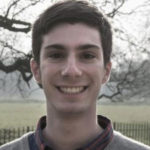This working group critically examines practices for information management workflows in geography scholarship. Participants will learn about various tools, techniques, and softwares they can use while working towards refining their own information management workflows.
May 25, 2022, 7:00pm Eastern Time – August 3, 2022, 8:00pm Eastern Time
Webinar Ended Jack Swab, University of Kentucky
Jack Swab, University of KentuckyJack Swab is a PhD student and Library Science student at the University of Kentucky who conducts research at the nexus of human geography and GIScience. Over the past several years Jack has worked to develop workflow for managing his research, and is excited to share what he has learned with other geographers. With his library science training, Jack will speak to some of the advantages and techniques of developing information workflows.
 Ian Spangler, University of Kentucky
Ian Spangler, University of KentuckyIan Spangler is an economic and cultural geographer interested in the histories and geographies of digital real estate technologies. As Assistant Curator of Digital & Participatory Geography at the Leventhal Map & Education Center, Ian has professional experience managing geospatial(meta)data and teaching library patrons about spatial data management strategies. As a PhD candidate in geography, he has also implemented many of the writing and research workflows discussed in this workshop while completing his dissertation.
We will select up to 20 graduate students to participate in this working group. Selection will be based on your AAG membership status, your research needs, and time of registration. If you are selected, we will notify you ahead of the working group and provide you all the working group details and session links. If you are selected, the expectation is that you will participate in all sessions of the working group.
This working group is a collective inquiry into everyday academic informational practices. As such, the primary factor for suitability in this working group is a desire to reflect on one’s own research, writing, and data organization practices, as well as explore or learn new ones. Otherwise, we’re impartial toward prior knowledge, progress towards degree, study area, subdiscipline, geographic background etc. That said, we do think there are two qualities that would make especially strong candidates for our working group: 1. An interest in technical workflows. This is not a working group about computers or computer software per se, but both of those things are foundational to the working group. We rely on programs/softwares including GitHub, Zotero, QGIS, pandoc, and a text editor of your choice, as well as markup languages like Markdown. Because of this, we ask that students have an interest in exposure to technical processes that help manage your academic workflows.If you are someone who self-describes as “not really a computer person,” that’s ok! We are here to help demystify some softwares to help you become more comfortable with them. As long as participants are open to learning (or teaching) about softwares and tools that can recalibrate your relationship to research, writing, and GIS, this working group would be a good fit. 2. An interest in the philosophy of academic practice. When do you write? Where do you write? What are the circumstances that make you comfortable when doing so? How do you take notes on your readings? Where do you store those notes? What technological affordances (paper, pencil, computer, internet) are essential to your workflow? How would your practices change if all of those comforts and affordances went away? What would frustrate you and what might you learn? These questions form a main conceit of the working group: to defamiliarize familiar practices around research, writing, and data management in order to understand why we do what we do the way we do it. Participants should be generally interested in questions like these and interested in developing their own answers to them.
This working group will meet at the following times (Eastern Time):
Throughout the summer, expect to also spend a few hours working independently on readings or short assignments for the working group.